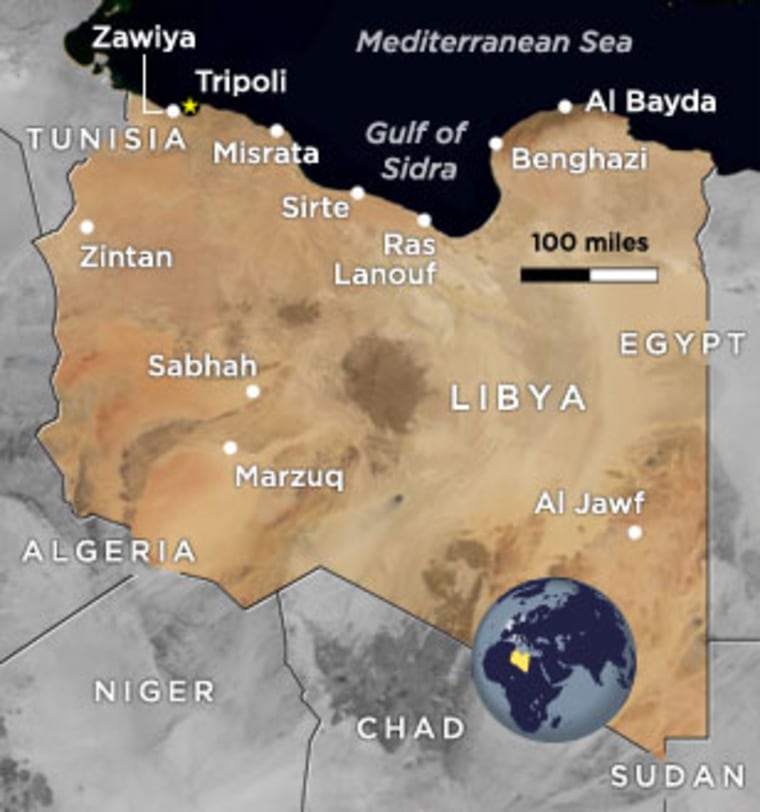In his speech to the nation Monday night on U.S. military intervention in Libya, President Barack Obama sharpened his definition of the policy he’s pursuing there, but left significant questions unaddressed.
Here’s how he expanded and clarified his policy:
- The United States is now receding to “a supporting role” in the campaign against Libyan leader Moammar Gadhafi and NATO is taking command of running the no-fly zone, the arms embargo and the task of protecting Libyan civilians from attacks by Gadhafi’s forces.
Obama said “the United States will continue to handle tasks such as intelligence gathering and search-and-rescue operations for downed pilots. As a result of the limited U.S. role, he said, “the risks and costs of this operation to our military and to American taxpayers will be reduced significantly.”
- Avoiding another Iraq war remains a primary rule guiding Obama’s decisions. Humanitarian intervention? Yes. Regime change? No.
“If we tried to overthrow Gadhafi by force, our coalition would splinter, we would likely have to put U.S. troops on the ground to accomplish that mission, or risk killing many civilians from the air” and enlarging “our share of the responsibility” for running post-Gadhafi Libya. “To be blunt, we went down that road in Iraq,” he said.
- Obama set out a strict case-by-case standard for intervention. The United States has intervened because these specific circumstances were the right ones.
“In this particular country, Libya, at this particular moment,” there was an alignment of factors: “the unique ability” of the United States to stop violence, “an international mandate for action, a broad coalition prepared to join us, the support of Arab countries” and the ability to stop Gadhafi “without putting American troops on the ground,” he said.
He seemed to imply that if those factors hadn’t been present, his decision on intervention would have been different.

- Another strategic reason to act: United Nations credibility. “The writ of the United Nations Security Council would have been shown to be little more than empty words” if the United States had refused to enforce the UN Security Council resolution passed on March 17, he said.
The interest of the United States was also at stake because massacres in Libya would have driven refugees into neighboring Tunisia and Egypt, straining the fragile governments there and sending the message to dictators in the Middle East that “violence is the best strategy to cling to power.”
What he did not address
- What plans are being prepared to deal with a potential military impasse?
The air campaign against Gadhafi “levels the playing field” but it may do it only enough to get Libyan situation to a stalemate. Then as Richard Haas, president of the Council on Foreign Relations wrote Monday, the civil war could be prolonged and “more suffering and loss of life would be result.”
Vice Admiral Bill Gortney, director of the military's Joint Chiefs of Staff said Monday the Libyan rebels “are not a very robust organization” and any gains of territory they make may be “tenuous.”
Military analyst Michael O’Hanlon of the Brookings Institution said Monday “there’s a distinct possibility of stalemate. The question then becomes, ‘how much do we want to escalate, through more airpower and perhaps through arming the rebels?’…. The administration has some difficult choices to make…. Chances are in the next one to two weeks they’re going to have to figure out if they want to escalate…”
Defense Secretary Robert Gates said Sunday that "no decision has been made... at this point" about the United States providing arms to the rebel forces in Libya, but that "the Security Council resolution would permit it."
But Obama clearly was not pointing in the direction of escalation in his speech Monday night.
- What steps is the Obama administration taking steps to monitor and prevent any Gadhafi-inspired terrorism?
Obama alluded to this by saying that until Gadhafi is gone from power “Libya will remain dangerous.” With about $6 billion in gold bullion at his disposal and a record of supporting terrorists in the 1980s, Gadhafi "is going to be insanely bent on revenge and much more dangerous than anything we encountered before,” said former Deputy Defense Secretary Paul Wolfowitz at a panel discussion at the American Enterprise Institute Monday afternoon.
- Will role will the United States play in Libya if Gadhafi leaves power?
Will the United States be part of any peacekeeping mission there? Obama implied that he wanted the American role to be tightly circumscribed. Again, avoiding another Iraq is the rule that is influencing him.